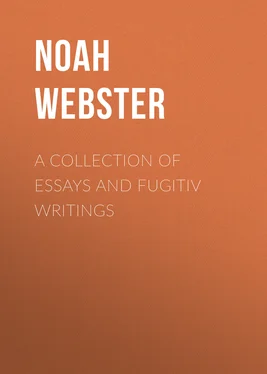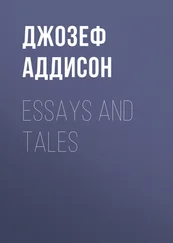Noah Webster - A Collection of Essays and Fugitiv Writings
Здесь есть возможность читать онлайн «Noah Webster - A Collection of Essays and Fugitiv Writings» — ознакомительный отрывок электронной книги совершенно бесплатно, а после прочтения отрывка купить полную версию. В некоторых случаях можно слушать аудио, скачать через торрент в формате fb2 и присутствует краткое содержание. Жанр: foreign_prose, foreign_antique, на английском языке. Описание произведения, (предисловие) а так же отзывы посетителей доступны на портале библиотеки ЛибКат.
- Название:A Collection of Essays and Fugitiv Writings
- Автор:
- Жанр:
- Год:неизвестен
- ISBN:нет данных
- Рейтинг книги:5 / 5. Голосов: 1
-
Избранное:Добавить в избранное
- Отзывы:
-
Ваша оценка:
- 100
- 1
- 2
- 3
- 4
- 5
A Collection of Essays and Fugitiv Writings: краткое содержание, описание и аннотация
Предлагаем к чтению аннотацию, описание, краткое содержание или предисловие (зависит от того, что написал сам автор книги «A Collection of Essays and Fugitiv Writings»). Если вы не нашли необходимую информацию о книге — напишите в комментариях, мы постараемся отыскать её.
A Collection of Essays and Fugitiv Writings — читать онлайн ознакомительный отрывок
Ниже представлен текст книги, разбитый по страницам. Система сохранения места последней прочитанной страницы, позволяет с удобством читать онлайн бесплатно книгу «A Collection of Essays and Fugitiv Writings», без необходимости каждый раз заново искать на чём Вы остановились. Поставьте закладку, и сможете в любой момент перейти на страницу, на которой закончили чтение.
Интервал:
Закладка:
In supporting the affirmativ of this question, I must face the opinions and prejudices of my countrymen; yet if we attend closely to the merits of the question, stripped of all its specious covering, we shall perhaps find more arguments in favor of the opinion, than we at first suspect.
In the first place, a Legislature must be the supreme power, whose decisions are laws binding upon the whole State. Unless the Legislature is the supreme power, and invested with all the authority of the State, its acts are not laws, obligatory upon the whole State. 18 18 The first convention of deputies in a state, is usually designed to direct the mode in which future legislatures shall be organized. This convention cannot abridge the powers of future legislatures, any further than they are abridged by the moral law, which forbids all wrong in general.
I am sensible that it is a favorite idea in this country, bandied about from one demagogue to another, that rulers are the servants of the people . So far as their business is laborious and embarrassing , it implies a degree of servitude; but in any other view, the opinion is totally false. The people ought at least to place their rulers, who are generally men of the first abilities and integrity, on a level with themselves; for that is an odd kind of government indeed, in which, servants govern their masters . The truth is, a Representativ, as an individual, is on a footing with other people; as a Representativ of a State, he is invested with a share of the sovereign authority, and is so far a governor of the people. In short, the collectiv body of the Representativs, is the collectiv sense and authority of the people; and so far are the members from being the servants of the people, that they are just as much masters , rulers , governors , whatever appellation we give them, as the people would be themselves in a convention of the whole State.
But in the second place, the public good or safety requires that the powers of a Legislature should be coextensiv with those of the people. That a Legislature should be competent to pass any law that the public safety and interest may require, is a position that no man will controvert. If therefore it can be proved that the reservation of any power in the hands of the people, may at times interfere with the power of the Legislature to consult the public interest, and prevent its exercise, it must be acknowleged, that such a reservation is not only impolitic, but unjust. That a Legislature should have unlimited power to do right , is unquestionable; but such a power they cannot have, unless they have all the power of the State; which implies an unlimited power to do wrong . For instance, suppose the constitution of any state to declare, that no standing army shall be kept up in time of peace; then the Legislature cannot raise and maintain a single soldier to guard our frontiers, without violating the constitution. To say that new enlistments every year will save the constitution, is idle; for if a body of troops raised for thirty years is a standing army, then a body raised for twenty years, or for six months, is a standing army; and the power to raise troops for a year, is a power to raise them at any time and maintain them forever; but with the addition of much trouble and a load of expense. Since therefore there never was, and probably never will be a time, till the millenium shall arrive, when troops will not be necessary to guard the frontiers of States, a clause in a constitution, restricting a Legislature from maintaining troops in time of peace, will unavoidably disable them from guarding the public interest. That a power to raise and equip troops at pleasure, may be abused, is certain; but that the public safety cannot be established without that power, is equally certain. The liberty of a people does not rest on any reservation of power in their hands paramount to their Legislature; it rests singly on this principle, a union of interests between the governors and governed . While a Legislator himself, his family and his property, are all liable to the consequences of the laws which he makes for the State, the rights of the people are as safe from the invasion of power, as they can be on this side heaven. This union of interest depends partly on the laws of property; but mostly on the freedom of election . The right of electing rulers is the people's prerogativ; and while this remains unabridged, it is a sufficient barrier to guard all their other rights. This prerogativ should be kept sacred; and if the people ever suffer any abridgment of this privilege, it must be their own folly and an irrecoverable loss.
Still further, I maintain that a people have no right to say, that any civil or political regulation shall be perpetual, because they have no right to make laws for those who are not in existence. This will be admitted; but still the people contend that they have a right to prescribe rules for their Legislature, rules which shall not be changed but by the people in a convention. But what is a convention? Why a body of men chosen by the people in the manner they choose the members of the Legislature, and commonly composed of the same men; but at any rate they are neither wiser nor better. The sense of the people is no better known in a convention, than in the Legislature. 19 19 The nominal distinction of Convention and Legislature was probably copied from the English; but the American distinction goes farther, it implies, in common acceptation, a difference of power . This difference does not exist in G. Britain. The assembly of Lords and Commons which restored Charles II, and that which raised the Prince of Orange to the throne, were called Conventions , or parliamentary Conventions . But the difference between these Conventions and an ordinary Parliament, is merely a difference in the manner of assembling; a Convention being an assembly or meeting of Lords and Commons, on an emergency, without the King's writ, which is the regular constitutional mode of summoning them, and by custom necessary to render the meeting a Parliament . But the powers of this assembly, whether denominated a Convention or a Parliament , have ever been considered as coextensive and supreme. I would just remark further, that the impossibility of establishing perpetual, or even permanent forms of government, is proved already by the experience of two States in America. Pensylvania and Georgia, have suffered under bad Constitutions, till they are glad to go thro the process of calling a new Convention. After the new forms of government have been tried some time, the people will discover new defects, and must either call a third Convention, or let the governments go on without amendment, because their Legislatures, which ought to have supreme power, cannot make altertations.–[1789.]
But admit the right of establishing certain rules or principles which an ordinary Legislature cannot change, and what is the consequence? It is this, a change of circumstances must supersede the propriety of such rules, or render alterations necessary to the safety or freedom of the State; yet there is no power existing, but in the people at large, to make the necessary alterations. A convention then must be called to transact a business, which an ordinary Legislature can transact just as well; a convention differing from the Legislature merely in name, and in a few formalities of their proceedings. But when people have enjoyed a tolerable share of happiness under a government, they will not readily step out of the common road of proceeding; and evils insensibly increase to an enormous degree, before the people can be persuaded to a change. The reservation therefore of certain powers may, by an imperceptible change of circumstances, prove highly pernicious to a State. For example: When the Commons of England were first admitted to a share in the legislation of that kingdom, which was probably in the reign of Henry III, in 1265, 20 20 This is the date of the first writs now extant, for summoning the Knights and Burgesses.
the representation was tolerably equal. But the changes in the population of different parts of the kingdom have destroyed all equality. The mode of election therefore should be reformed. But how shall it be done? If there is a constitution in that kingdom, which settles the mode of election, and that constitution is an act of the people, paramount to the power of the Parliament, and unchangeable by them, a convention of the people must be called to make an alteration which would be as well made in Parliament. This would occasion infinite trouble and expense.
Интервал:
Закладка:
Похожие книги на «A Collection of Essays and Fugitiv Writings»
Представляем Вашему вниманию похожие книги на «A Collection of Essays and Fugitiv Writings» списком для выбора. Мы отобрали схожую по названию и смыслу литературу в надежде предоставить читателям больше вариантов отыскать новые, интересные, ещё непрочитанные произведения.
Обсуждение, отзывы о книге «A Collection of Essays and Fugitiv Writings» и просто собственные мнения читателей. Оставьте ваши комментарии, напишите, что Вы думаете о произведении, его смысле или главных героях. Укажите что конкретно понравилось, а что нет, и почему Вы так считаете.












